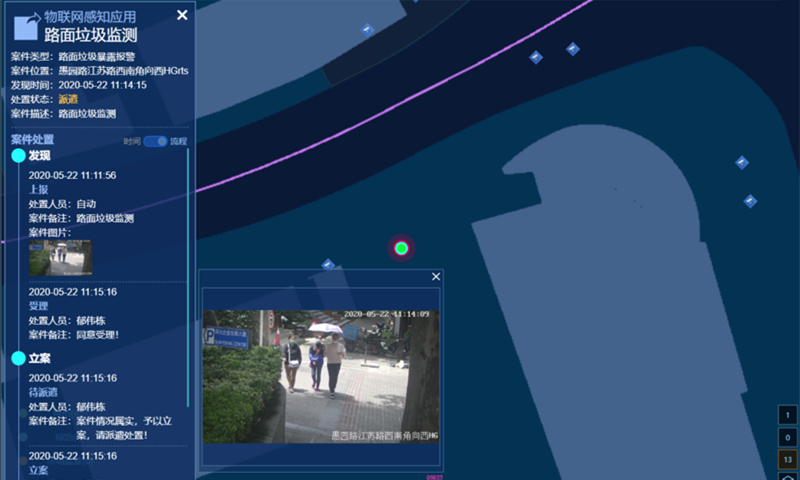Chinese officials and experts refute ‘cameras monitor people’ smear
By Huang Lanlan and Li Lei Source: Global Times Published: 2020/7/31 1:01:47

City cameras can help find the rubbish on the roads (photo: courtesy of Jiangsu Road sub-district urban operation and management center)
Clichés smearing Chinese cities for installing closed-circuit television (CCTV) cameras to "monitor people," which have reappeared in the Western media to serve their agenda of attacking China's smart city construction, are complete nonsense, Chinese officials and experts told the Global Times.Some media coverage depicts China's populous metropolises, such as Shanghai, as being "monitored" cities with people living under "a vast surveillance system" that keeps an eye on their every move. "The accusation is groundless and unreasonable," said Xie Yongjiang, executive director of the internet management and legislation research center of Beijing University of Posts and Telecommunication.
In Shanghai, the government installs the CCTV cameras to serve citizens rather than "monitoring" them, said some local officials reached by the Global Times, who are engaged in Shanghai's smart city projects.
The city has built several urban operation and management centers for its grass-root communities - a governmental high-tech digital platform that provides effective O2O services for residents based on the data from the CCTV cameras and local administrative bodies.
In its downtown 1.52-square-kilometer Jiangsu Road sub-district, where 80,000 residents live, there are more than 600 cameras installed on 18 local main roads and streets. They help to find the rubbish on the roads and improperly parked bikes, as well as recording traffic conditions, said Zhang Zheren, director of the sub-district's urban operation and management center.
By scanning the roads every 30 minutes, the cameras can find garbage, take photos of it and send the photos to the center, Zhang said. The center then automatically delivers the digital photos to the local sanitation department, which later assigns staff to move the garbage, he said.
"The whole process lasts only 30 minutes, one-quarter of the time without the cameras," Zhang said. In the past, it usually took hours for the residents who encountered the rubbish and reported it to local service hotlines to get help.
Zhang and his colleagues are planning to broaden the functions of the cameras, such as detecting water-logging on roads after heavy rain. All the functions are designed to offer local citizens more convenience, Zhang said.
"It's laughably ridiculous that they [Western media] say we use the cameras to 'monitor' people," he told the Global Times. "All we want is to create a safe and friendly environment for our citizens."
Some Western countries and their media hold a double standard on whatever China does, including using modern technology in city management, Xie said. "Such a high-tech product (surveillance cameras) is a convenient and effective tool in city management, which has been widely used in the world," he added.
An official with the Chinese Cybersecurity Association said that China attaches great importance to legislation and measures to protect citizens' privacy, which is now secure under the protection of relevant terms in China's civil code and personal information protection law.
Xie told the Global Times that the installation of surveillance cameras in public venues should follow strict regulations, and the data collected is under strict management.
The cameras that people see in some private spaces, such as in the residential areas, are usually installed by local property management companies with the permit of the house-owner committees, explained an anonymous information managing official in Shanghai.
"The [local] government has never installed cameras in non-public places," he told the Global Times.
Unlike some Western media's claims that Chinese regional authorities install "hidden" cameras to monitor citizens, many city governments including Shanghai's have made the quantities and places of the cameras public, observers found.
On Shanghai's open data platform data.sh.gov.cn, the public security administration uploaded the detailed locations of the city's 26,774 road cameras, which are accessible to everyone. The last update of the information was on January 2, the platform shows.
These cameras have largely contributed to Shanghai's public security and order, helping local police track and arrest 60,000 criminal suspects in 2016, according to data from the Shanghai police.
This is contrary to a report released by British technology website Comparitech that has been quoted by many Western media outlets to support their attacks against China, saying there's "little correlation" between the CCTV cameras and crime or safety.
The current distribution and number of surveillance cameras in China is reasonable in order to ensure public security, Xie said. "Full coverage of some public venues with surveillance cameras is critical for ensuring public security, such as solving a crime in a more effective and accurate manner with more information acquired," he added.
RELATED ARTICLES: